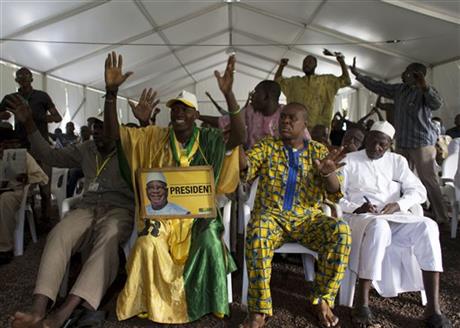
By RUKMINI CALLIMACHI
Supporters of Ibrahim Boubacar Keita briefly celebrate as they watch the televised reading of election results, at Keita campaign headquarters in Bamako, Mali, Friday, Aug. 2, 2013. Mali’s presidential race will go to a second round on Aug. 11. Keita finished with a strong lead over his next closest rival, Soumaila Cisse, but still well shy of the majority needed to win outright in the first round.(AP Photo/Rebecca Blackwell)
BAMAKO, Mali (AP) — A career politician, known for ruling with a firm hand, took the lead in Mali’s first presidential election since last year’s coup, according to provisional results announced Friday, a sign that Malians are looking for decisive leadership after months of turmoil.
Mali will still face a runoff later this month, however, since none of the 28 candidates received a majority of the vote.
Ibrahim Boubacar Keita, a former prime minister and speaker of the country’s parliament, received about 39.2 percent of the 3.1 million votes that were cast. He will face off against second-place finisher, former Finance Minister Soumaila Cisse, who received half as many votes with 19.4 percent, according to the results announced by the Minister of Territorial Administration Moussa Sinko Coulibaly.
Known to everyone by his initials “IBK,” Keita is known for his tough demeanor, blunt message delivery and his uncompromising stance once he takes a position. These qualities have cost him support in the past, but they were cited as the very reason why people voted for him during an election that comes just months after French soldiers intervened in a military campaign to free Mali’s northern half from the grips of al-Qaida’s army in the region.
“I voted for IBK and so did all the soldiers that are under me because we know that we need a strong leader to deal with the problems in the north,” said Lt. Mohamed Lamine Ag Klita, who is stationed in the northernmost province of Kidal, a city at the epicenter of the most recent rebellion which remains largely under rebel rule. “Mali needs a dictator.”
Keita, 68, is in many ways a foil of ex-President Amadou Toumani Toure, or “ATT,” who was overthrown in last year’s March coup. Toure tried to rule the country by consensus and making concessions. It was a strategy that allowed Mali to emerge from the first three Tuareg-led rebellions in the 1960s, 1990s and in 2007, conflicts that ended with the signing of accords promising the north greater resources and influence.
Voters who said they cast ballots for Keita in the July 28 poll said that Toure’s strategy may have won peace in the short term, but it laid the seeds for the most recent rebellion which broke out in January of 2012, led by veterans of past insurgencies who learned they could win concessions through the gun. Their campaign was fueled by an influx of weapons and well-trained fighters from neighboring Libya following the collapse of Moammar Gadhafi’s regime, as well as by al-Qaida’s army in the region, which joined forces with the separatists, helping them seize Mali’s northern half.
As town after town fell to the rebels last year, soldiers in the capital mutinied, overthrowing Toure, which created the security vacuum needed for the insurgents to advance. Rebels succeeded in seizing and controlling an Afghanistan-sized stretch of land, before France intervened in a military campaign earlier this year, flushing out the fighters and pushing Mali to hold the election to restore constitutional rule.
During Keita’s time as prime minister and head of parliament, he was also uncompromising in his dealings with the Tuareg separatists. When he tried to make a campaign stop last month in Kidal, Tuareg separatists drove pickup trucks onto the runway to try to stop his plane from landing. They later pelted the parked jet with stones.
“IBK is the man of the moment. We don’t need a technocrat. We don’t need some big intellectual. We need a guy who can right the country,” said Mahamane Toure, a 48-year-old waiter. “He’s a fighter,” he said, punching his fist into his hand. “He hits things with his head. When he says ‘no,’ it’s ‘no.'”
Keita will face Cisse in the runoff on Aug. 11.
Cisse most recently headed the West African Monetary Union. In the days before the election results were announced, he accused the election body of massive fraud, pointing out that Coulibaly, the minister of territorial administration, is known to be close to Mali’s junta, which overthrew the nation’s democratically elected leader last year. Many believe that the junta is backing Keita.
By contrast, Cisse, a diminutive man, was among the political figures targeted by the junta after their March 2012 coup. His hand still bears the scars from when he threw himself over his home’s chain link fence, crushing two vertebrae after soldiers allied with the junta broke down his front door a few weeks after the coup. He spent months in rehab in France before returning to Mali.
Earlier this week, Coulibaly had announced that early results indicated that Keita would likely win on the first round, giving rise to speculation that the junta would try to gerrymander the results to assure a first-round win for Keita.
On Friday, Cisse cried foul, saying the vote was marred by irregularities.
“We are astonished to learn the number of votes that were discarded as null — more than 400,000,” he said. “We are going to ask the constitutional court to look at these ballots. Many of these ballots were thrown out by certain polling station presidents who were pretending not to know the law. I assure you that the (final) percentages are going to change,” he said.
Regarding the upcoming runoff, Cisse said: “I want concrete measures to be taken so that the fraud can be strangled.”
___
Associated Press writer Baba Ahmed contributed to this report.



